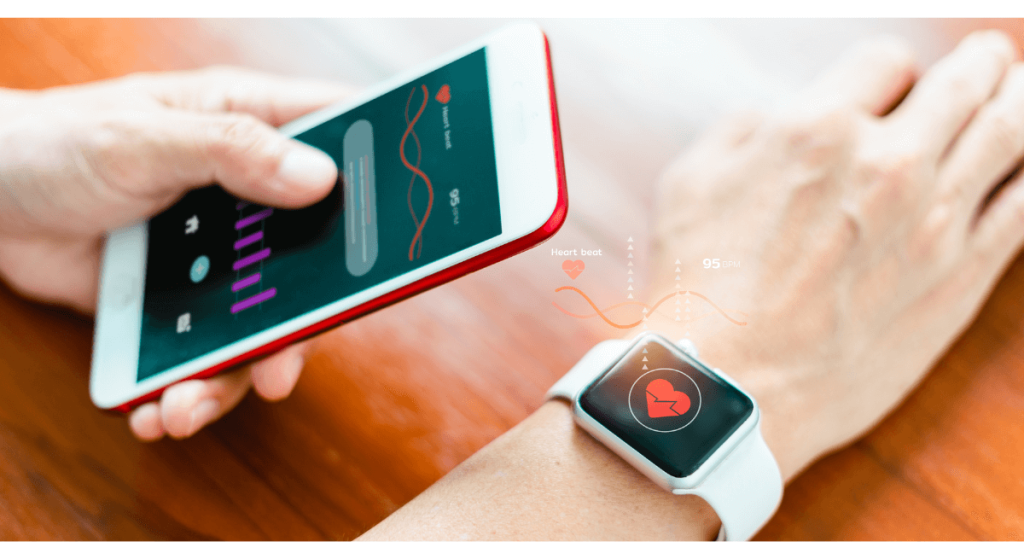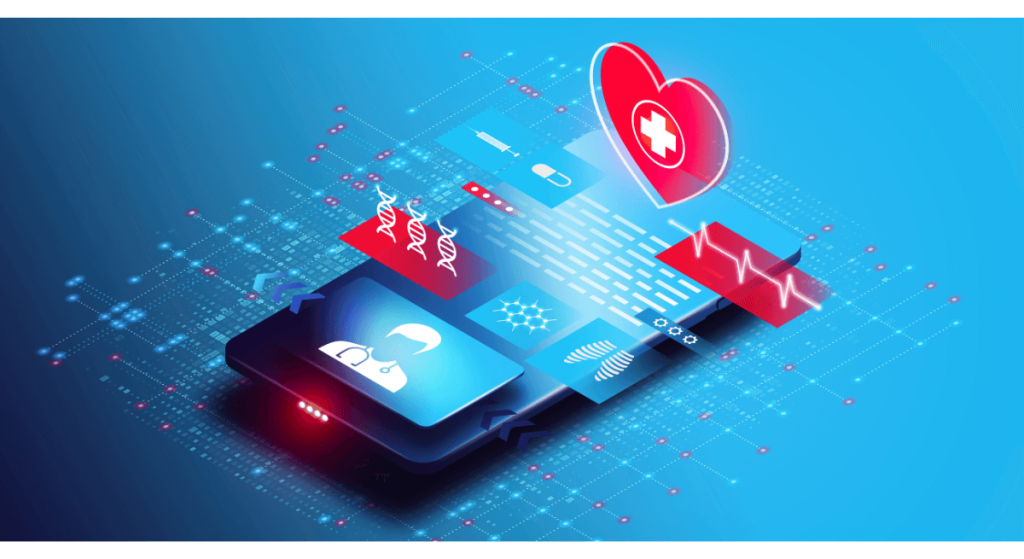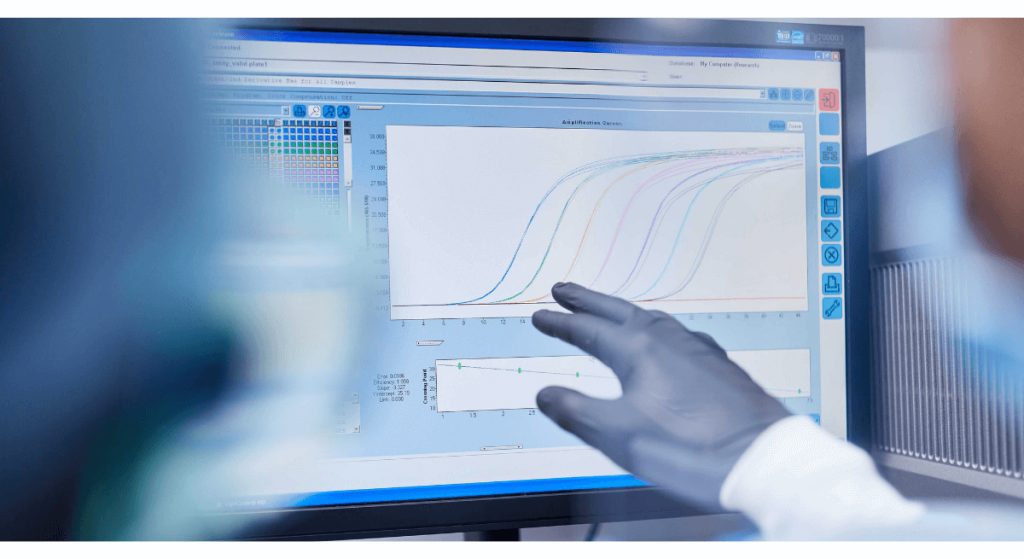
I. Introduction – Digital transformation in healthcare
Digital transformation in healthcare is reshaping the future of patient care and medical practice management. This article will delve into the pivotal role of technology in modernizing health services, from leveraging big data to adopting wearable devices.
We’ll explore why healthcare providers must embrace digital trends, the impact of artificial intelligence and machine learning, and how these advancements contribute to enhanced patient experiences.
Additionally, we’ll discuss the operational benefits, address potential challenges, and glimpse the promising future shaped by these digital innovations.
Overview of digital transformation in healthcare
Digital transformation in healthcare marks a significant shift towards more agile, efficient, and patient-centered services. It integrates modern technologies like AI, big data, and mobile applications to redefine patient care and streamline operations.
This shift not only enhances the quality of care but also expands access, improves patient outcomes, and lowers costs.
Embracing this change, healthcare providers are moving from traditional practices to innovative, technology-driven approaches that promise a better future for healthcare delivery.

Importance of embracing digital trends
Embracing digital trends in healthcare is crucial for several compelling reasons. Firstly, it aligns healthcare services with the increasing digital proficiency of patients. It also ensures that healthcare providers stay competitive in a rapidly evolving industry. Adopting digital trends helps in:
- Improving patient engagement and satisfaction through convenient, tech-driven interactions.
- Enhancing the accuracy and speed of diagnoses and treatments.
- Reducing operational costs and eliminating inefficiencies.
This forward-thinking approach is essential for healthcare organizations to deliver high-quality care and meet the growing demands of modern healthcare consumers.

II. Technological Advances Driving Transformation
Under the umbrella of Technological Advances Driving Transformation, we will explore the innovative technologies that are the bedrock of the healthcare sector’s digital overhaul. Big Data and Analytics, AI and Machine Learning, Wearable Devices, and Blockchain are not just buzzwords; they are the engines powering a more informed, efficient, and patient-focused future.
These technologies are crucial for the predictive, preventive, and personalized medicine paradigm, redefining how healthcare providers approach everything from patient diagnostics to secure data management. In the following sections, we’ll delve into each of these transformative forces and their profound impact on the healthcare industry.
Big Data and Analytics
Big Data and Analytics are transformative elements in healthcare, bringing about precision and efficiency in patient care. By aggregating vast amounts of data from various sources, they enable healthcare providers to:
- Identify health trends and improve disease surveillance.
- Tailor treatments through comprehensive patient health records analysis.
- Enhance resource allocation by predicting patient admission rates and staffing needs.
These analytics offer a roadmap for healthcare facilities to not only reduce errors but also craft preemptive care strategies, ultimately leading to better health outcomes and cost savings.
Artificial Intelligence and Machine Learning
Artificial Intelligence (AI) and Machine Learning are at the forefront of innovation in healthcare, offering remarkable capabilities across various domains:
Precision Medicine: AI systems analyze genetic information to personalize patient treatments, significantly boosting the effectiveness of medical interventions.
Medical Imaging and Diagnostics: These technologies enhance the precision of diagnostics by assisting in the interpretation of complex imaging, leading to more accurate diagnoses.
Drug Discovery and Development Cycles: AI accelerates the drug development process, reducing timeframes and costs associated with bringing new medications to market, benefiting both providers and patients.

Together, AI and Machine Learning are not just future concepts but present-day tools that are essential for advancing healthcare toward more tailored and impactful patient care.
Wearable Medical Devices and Remote Monitoring – Digital transformation in healthcare
Wearable Medical Devices and Remote Monitoring are revolutionizing patient management by empowering individuals with real-time health data. These devices are instrumental in:
- Tracking vital signs like heart rate and blood glucose levels, facilitates immediate medical responses.
- Enabling continuous patient monitoring outside traditional clinical settings, which is crucial for chronic disease management.
- Providing healthcare professionals with a stream of data to inform better treatment decisions and preventive care strategies.

As a result, wearable technology is not just a convenience but a critical component in the shift towards preventive healthcare and enhanced patient autonomy.
Blockchain for Secure Health Records
Blockchain technology is poised to significantly bolster the security and efficiency of health records management. By creating an immutable ledger for health records, blockchain offers:
- Enhanced protection against data breaches, ensuring patient information remains confidential and secure.
- A streamlined approach for sharing medical records, reducing the risk of errors and inconsistencies.
- Greater patient control over their health data, fostering trust and transparency between patients and healthcare providers.

This robust framework is set to redefine how health data is stored, accessed, and managed, leading to a more secure and patient-centric healthcare system.
III. Enhancing Patient Experience and Care – Digital transformation in healthcare
In this section, we delve into the patient-centric innovations reshaping the healthcare experience. From the convenience of Telemedicine to the immersive experiences offered by Virtual Reality in pain management, these technologies are not just enhancing care but revolutionizing the patient’s role in their health journey.
Mobile Health Applications bring healthcare management to patients’ fingertips, while Customized Patient Care through Data Analysis ensures that treatment is tailored to the individual’s unique health profile. Together, these advancements are empowering patients and enabling a level of personalized care that was once unimaginable.
Telemedicine and Virtual Care
Telemedicine and Virtual Care have become vital components of modern healthcare, especially in increasing access and convenience for patients. This technology allows for:
- Remote consultations, which eliminate travel and reduce waiting times.
- Continuous care for patients with chronic conditions, regardless of their location.
- Flexible access to specialists and mental health services, expanding the reach of quality care.

These digital care pathways are essential in creating a more accessible, efficient, and patient-centered healthcare system, making professional care available with just a click.
Virtual Reality in Pain Management and Rehabilitation – Digital transformation in healthcare
Virtual Reality (VR) is carving out a new frontier in pain management and rehabilitation, providing an immersive escape from discomfort and a novel approach to recovery. Within this realm:
- VR distracts from pain, reducing reliance on pharmaceuticals and enhancing patient comfort.
- It offers engaging rehabilitation environments that can speed up the healing process.
- VR technology aids in treating conditions like PTSD, anxiety, and stroke recovery by simulating real-world scenarios in a controlled setting.
This innovative use of VR not only changes the patient’s experience of treatment but also has the potential to improve outcomes and revolutionize therapeutic practices.
Mobile Health Applications and Patient Empowerment
Mobile Health Applications are empowering patients by placing control of their health directly in their hands. These applications enable:
- Easy tracking of personal health data, such as daily activity levels and nutritional intake.
- Direct communication with healthcare providers, streamlining appointment scheduling and follow-ups.
- Access to medical records and test results, fostering an informed and engaged patient population.
This empowerment leads to better health outcomes, as patients can take proactive steps in their healthcare journey, supported by the convenience and connectivity of mobile technology.
Customized Patient Care through Data Analysis
Customized Patient Care through Data Analysis leverages the power of data to tailor healthcare to individual needs. This approach allows for:
- Personalized treatment plans based on patient history, lifestyle, and preferences.
- Predictive health insights that can forecast individual health risks and interventions.
- Enhanced decision-making by clinicians, informed by a comprehensive analysis of patient data.

Data analysis thus plays a pivotal role in delivering care that is as unique as each patient, improving outcomes and patient satisfaction through customization.
IV. Operational Efficiency and Cost-Effectiveness – Digital transformation in healthcare
In the pursuit of a more efficient and patient-centric healthcare system, advancements in Predictive Healthcare, Streamlined Electronic Health Records (EHRs), and Improved Insurance and Payment Models are essential.
These components work in tandem to enhance the planning and delivery of healthcare services. By anticipating patient needs, simplifying the management of health records, and refining financial transactions, the healthcare industry is not only boosting its operational efficiency but also elevating the quality of care provided to patients.
The integration of these strategies is crucial for building a responsive, sustainable, and patient-focused healthcare future.
Predictive Healthcare and Resource Management
Predictive Healthcare and Resource Management are pivotal in optimizing the allocation of medical resources and enhancing patient care proactively. This proactive approach is characterized by:
- Utilizing predictive analytics to anticipate patient influx and effectively manage hospital occupancy.
- Tailoring preventive programs to individual patient risk profiles to avert adverse health events.
- Allocating medical staff and resources more efficiently to improve response times and patient outcomes.
By anticipating healthcare needs, providers can improve care delivery, reduce waste, and ultimately provide a more responsive healthcare system.
Streamlined Electronic Health Records (EHRs)
Streamlined Electronic Health Records (EHRs) serve as the digital backbone of patient information management, greatly enhancing the quality and coordination of care. The benefits of streamlined EHRs include:
- Centralized patient data for easy access and updates by healthcare professionals.
- Reduced administrative burden, allowing clinicians more time for patient care.
- Fewer medical errors and duplications, thanks to a single, comprehensive patient health record.

These improvements in health record management are crucial for facilitating seamless care transitions and fostering a more collaborative treatment environment.
Improved Insurance and Payment Models – Digital transformation in healthcare
Improved Insurance and Payment Models, influenced by digital transformation, are simplifying the financial aspects of healthcare for both providers and patients. These advancements lead to:
- More transparent billing processes, enabling patients to understand and manage their healthcare expenses better.
- Enhanced claims processing through automation, reducing delays and errors in reimbursements.
- The introduction of value-based care models, which align patient outcomes with cost efficiency.
These refinements to payment systems not only streamline financial operations but also aim to improve the overall affordability and quality of healthcare services.
V. Challenges and Considerations – Digital transformation in healthcare
Cybersecurity and Data Privacy
Cybersecurity and Data Privacy are critical concerns in the digital transformation of healthcare, as the protection of sensitive patient information is paramount. In addressing these concerns, healthcare organizations are:
- Implementing robust cybersecurity measures to safeguard against data breaches and cyber threats.
- Adhering to stringent data privacy regulations to ensure the confidentiality of patient records.
- Engaging in continuous monitoring and updating of security protocols to keep pace with evolving digital risks.
These efforts are vital in maintaining patient trust and ensuring that the advancements in healthcare technology are not compromised by security vulnerabilities.

Regulatory Compliance and Standardization – Digital transformation in healthcare
Regulatory Compliance and Standardization are essential facets of healthcare digital transformation, ensuring that new technologies are safely and uniformly integrated into the existing healthcare infrastructure. Efforts in this area focus on:
- Aligning digital health tools and practices with established medical regulations and standards.
- Facilitating interoperability between different healthcare systems and technologies.
- Ensuring that digital health innovations are accessible and beneficial across various healthcare settings.
Adhering to these regulatory frameworks not only promotes patient safety and privacy but also fosters a cohesive healthcare environment that can adapt to ongoing technological advancements.
Integration with Existing Healthcare Systems
Integration with Existing Healthcare Systems is a cornerstone of successful digital transformation in healthcare. This process involves:
- Seamlessly incorporating new technologies into the current health IT ecosystem.
- Ensuring that digital solutions are compatible with legacy systems to prevent data silos.
- Training healthcare personnel to effectively use and transition to these advanced tools.
Such integration is crucial for maximizing the benefits of digital innovations, improving care delivery, and enhancing the user experience for both healthcare professionals and patients. It requires careful planning and execution to ensure a smooth transition that complements and enhances the existing healthcare infrastructure.

VI. Future of Healthcare with Emerging Technologies – Digital transformation in healthcare
The final section of our exploration into digital transformation in healthcare focuses on the technologies shaping the future of the industry. We will discuss the profound impact of 5G Technology on healthcare delivery, the innovative applications of Augmented Reality in medical training and practice, and the pivotal Role of AI in spearheading healthcare innovations.
These technologies are not mere enhancements; they are revolutionary forces that are redefining the boundaries of healthcare capabilities, setting the stage for a future where healthcare is more efficient, accessible, and tailored to individual patient needs.
5G Technology and Instantaneous Healthcare Delivery
5G Technology is set to revolutionize healthcare delivery by providing the infrastructure needed for instantaneous communication and data transfer. The implications for healthcare are profound, offering:
- Near-instant access to high-definition patient imaging, facilitating quicker and more accurate diagnoses.
- Real-time data transmission for remote monitoring and telehealth services, ensuring timely medical interventions.
- Enhanced capabilities for mobile health applications, enabling them to operate with greater efficiency and reliability.

The adoption of 5G technology in healthcare paves the way for innovative care models, such as telesurgery and virtual consultations, dramatically improving patient care and service delivery.
Augmented Reality and Advanced Training Tools
Augmented Reality (AR) and Advanced Training Tools are transforming medical education and practice. These technologies enable:
- Medical students and professionals to practice procedures in a risk-free, virtual environment.
- Surgeons to visualize complex anatomical structures during procedures, enhancing precision.
- First responders and clinicians to receive real-time guidance during critical situations.
By integrating AR into training and practice, the healthcare industry is improving skill acquisition, reducing errors, and delivering more effective patient care.
The Role of AI in Future Healthcare Innovations
The Role of AI in Future Healthcare Innovations is poised to be transformative, with AI set to become a linchpin in advancing healthcare services. Moving forward, AI is expected to:
- Drive the development of new diagnostic and treatment protocols through advanced pattern recognition.
- Enhance personalized medicine by learning from a vast array of patient data to suggest customized treatment plans.
- Automate routine tasks, allowing healthcare professionals to focus on complex and patient-centered activities.
AI’s expanding capabilities will continue to unlock new possibilities in healthcare, making services more efficient, predictive, and personalized than ever before.

VII. Conclusion
The Continuous Evolution of Digital Healthcare
Digital healthcare is not static; it’s a field in constant motion, evolving with each technological breakthrough. This evolution is characterized by an ever-expanding toolkit of digital resources, from AI to 5G, each bringing new capabilities and challenges.
It’s a journey of transformation, where the ultimate destination is a healthcare landscape that’s thoroughly modernized, highly efficient, and deeply patient-focused.
The Role of Healthcare Providers in Adapting to Change
For healthcare providers, adaptability is key in this era of digital change. It’s about embracing new technologies, yes, but it’s also about cultivating a mindset ready for continuous learning and innovation. Providers sit at the crux of this transformation, responsible for integrating new tools into their practice, all while maintaining the compassion and care at the heart of the profession.
Their role is to bridge the gap between human touch and technological efficiency, ensuring that the digital transformation of healthcare remains grounded in the needs of the patients they serve.
FAQ – Digital transformation in healthcare
Big Data enables the aggregation and analysis of vast patient information, allowing healthcare facilities to forecast trends, prepare for future demands, and allocate resources effectively. It supports the creation of predictive models for patient admissions and helps in tailoring preventive care for at-risk groups.
AI and Machine Learning significantly shorten the drug development cycle by rapidly analyzing complex biological data. This accelerates the pace of discovery, reduces costs, and leads to the development of more effective drugs by identifying promising compounds quicker than traditional methods.
Wearable devices empower patients by providing them with real-time health data, encouraging self-management of their health. They enable continuous monitoring for chronic conditions and offer insights that help in making informed decisions about lifestyle and treatment options.
Healthcare providers encounter several challenges, such as ensuring interoperability between new digital solutions and legacy systems, maintaining data security and privacy, and training staff to adapt to new technologies. Successfully overcoming these challenges is critical for the seamless adoption of digital healthcare innovations.
Antoni Łącki
Project Manager